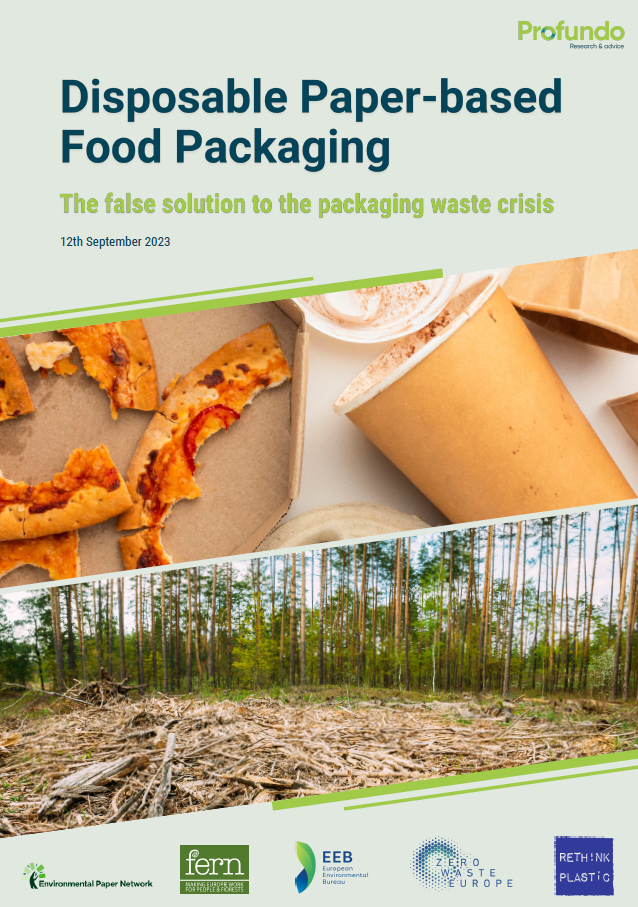
The Sicilian municipality of Calatafimi Segesta may be small, but it provides one of Europe’s leading examples of how an island municipality can implement an effective zero waste strategy whilst also focusing on improving the lives of the local community. Despite receiving high-levels of tourism each year and having a dense, historic area in its centre, Calatafimi Segesta still achieved a 85% separate collection rate and generated just 88kgs of residual waste per person in 2022.
The municipality achieved these impressive results through a process of implementing a zero waste strategy at its core, with a focus on door-to-door collection of materials and the prioritisation of capturing organics, with supplementary incentives offered to residents who home composted. The decision not to build or extend local incineration capacity has allowed the municipality to implement ambitious policies that have delivered results.
Since its political commitment to become a Zero Waste City in 2011, the municipality has doubled the amount of materials separately collected for recycling and reuse. In this same timespan, they have reduced the volume of residual waste by two-thirds.
Available in English and Italian.
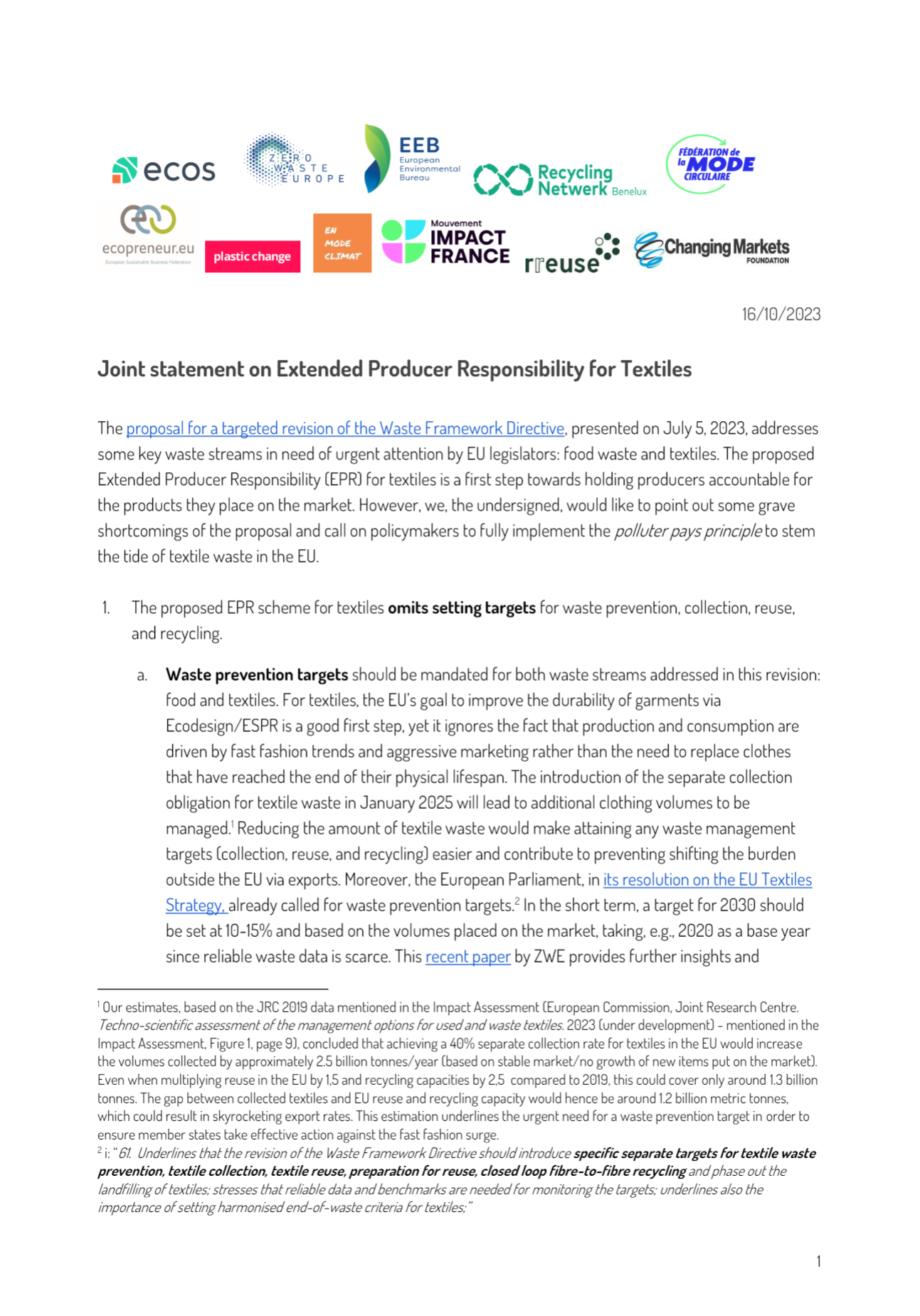
In this joint statement, eleven NGOs and progressive business associations call for action to make the EU-wide Extended Producer Responsibility (EPR) for textiles, as proposed under the revision of the Waste Framework Directive, a success. The measure must not only ensure sound waste management but also tackle the surge of textile waste in Europe at its source.
Available in English
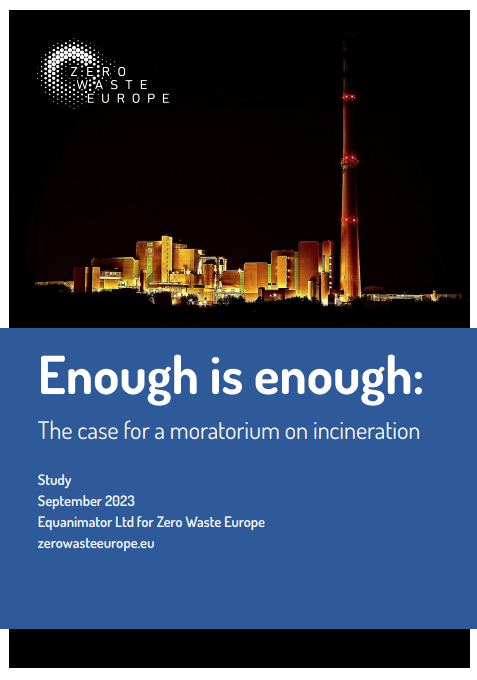
This report by Zero Waste Europe highlights a critical concern surrounding the surplus waste incineration capacities in the European Union. This comprehensive study reveals a troubling pattern of annual growth in waste incineration capacity, with a surplus reaching 60 million tonnes in 2020 and the potential to soar to a staggering 220 million tonnes by 2023. The report underscores the urgent need for EU-wide measures and recommends a reevaluation of incineration’s position in the waste hierarchy, potentially reclassifying it as a disposal operation, to foster more sustainable waste management practices throughout the region.
Executive summary available in English, Italian, and Bulgarian.
Full report available in English.
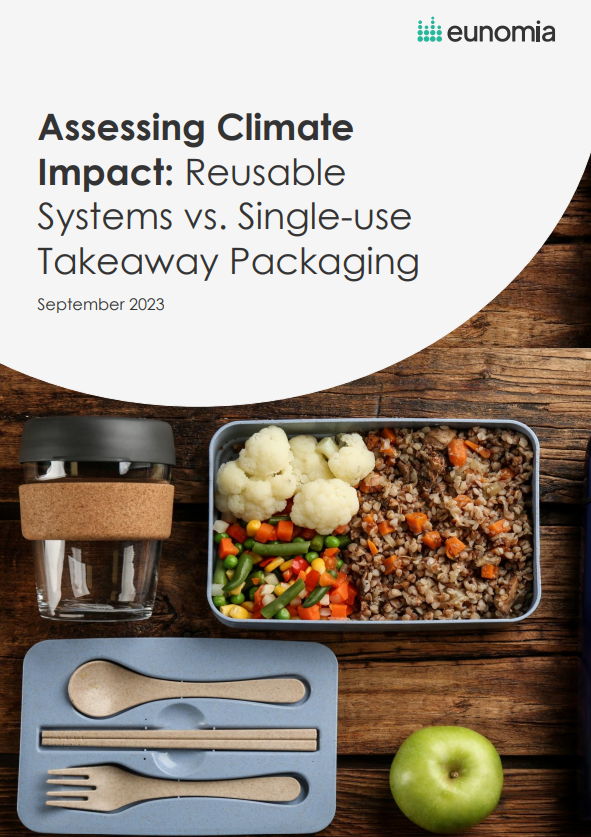
In this study authored by Zero Waste Europe, Reloop, and TOMRA, and produced by Eunomia Research & Consulting Eunomia, reusable take-away packaging demonstrates its potential for significant greenhouse gas emission reductions compared to single-use alternatives. The study examines various packaging types, including cups, burger boxes, bowls, pizza boxes, and sushi containers, highlighting emissions reduction potential with efficient return and washing systems.
The study identifies breakeven points, such as return rates for bowls and coffee cups to match single-use carbon footprints. Envisioned in 2030, the study foresees efficient collection, washing, and redistribution of reusable packaging, emphasising its role in a cleaner and sustainable future. These findings guide effective reusable system implementation, stressing emissions reduction and design importance, encouraging large-scale trials for validation and refinement.
Executive summary available in English, French, Italian, Croatian, and Ukrainian.
Full report available in English.
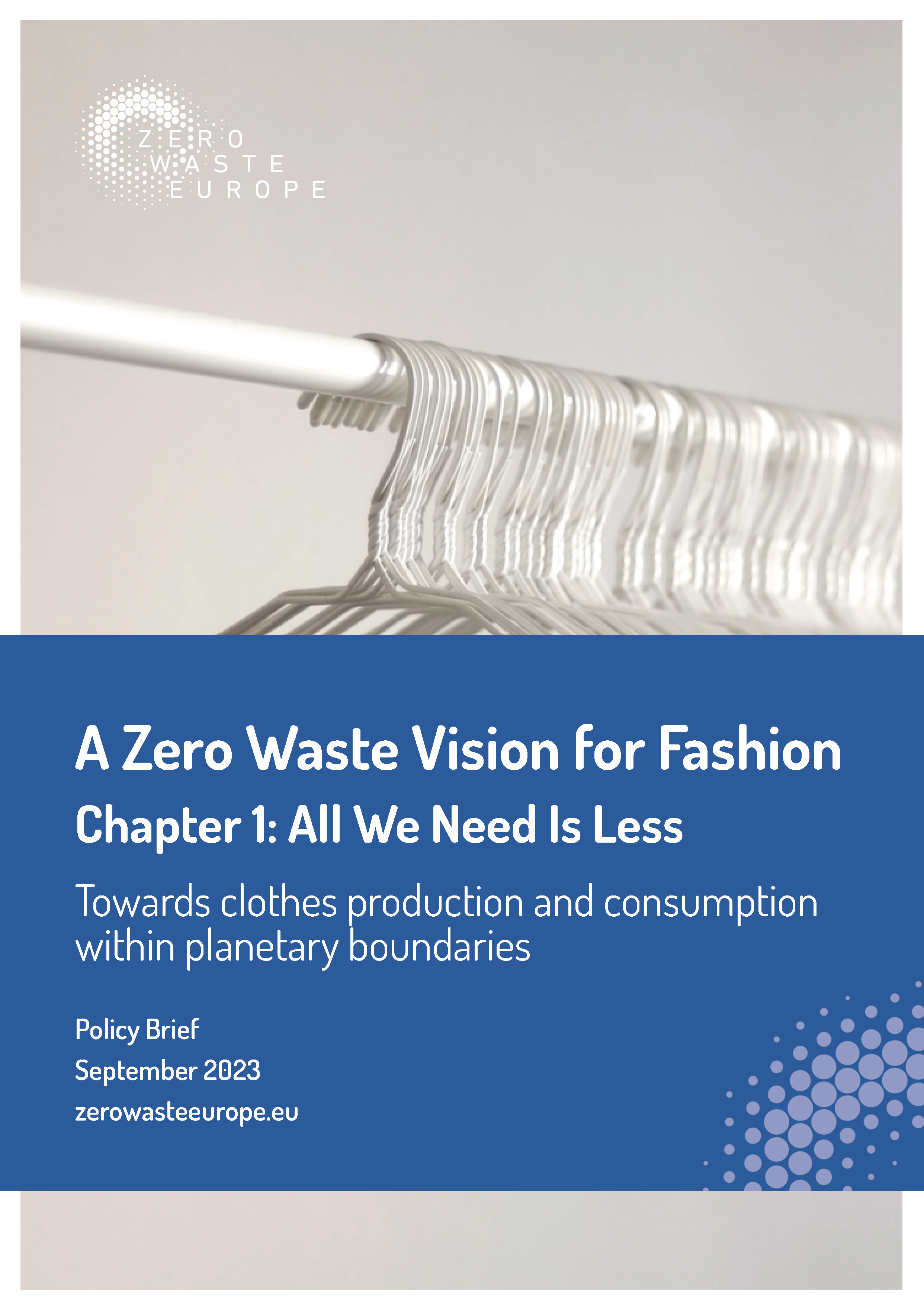
Without a shift to sufficiency in the fashion sector, the industry is on track to exceed planetary boundaries.
In this paper, ZWE outlines a list of entry points for the transition towards sufficiency and urges governments to take proactive steps to adopt best practices. More precisely, the paper suggests a legal framework banning the destruction of unsold goods, setting a target for textile waste reduction and resource use and transforming EU waste legislation into a ‘Resource Framework Directive’ in line with a 1.5-degree target.
The paper underlines that governments should not rely on so-called consumer behaviour ‘nudges’ to cut down on fashion consumption and must address the cause of the current waste crisis: the fast fashion business model that relies on selling large volumes of trendy items. The textile sector’s transformation is a critical milestone, yet it’s only part of a broader economic shift toward sufficiency, well-being, and resilience within planetary boundaries.
This paper serves as the inaugural chapter in a two-part series exploring fashion and textiles along the entire value chain. The subsequent chapter will delve into circularity, covering optimal design, use, reuse, recycling, and end-of-life treatment of garments.
Executive Summary available in English, Italian, and Croatian.
Full paper available in English.
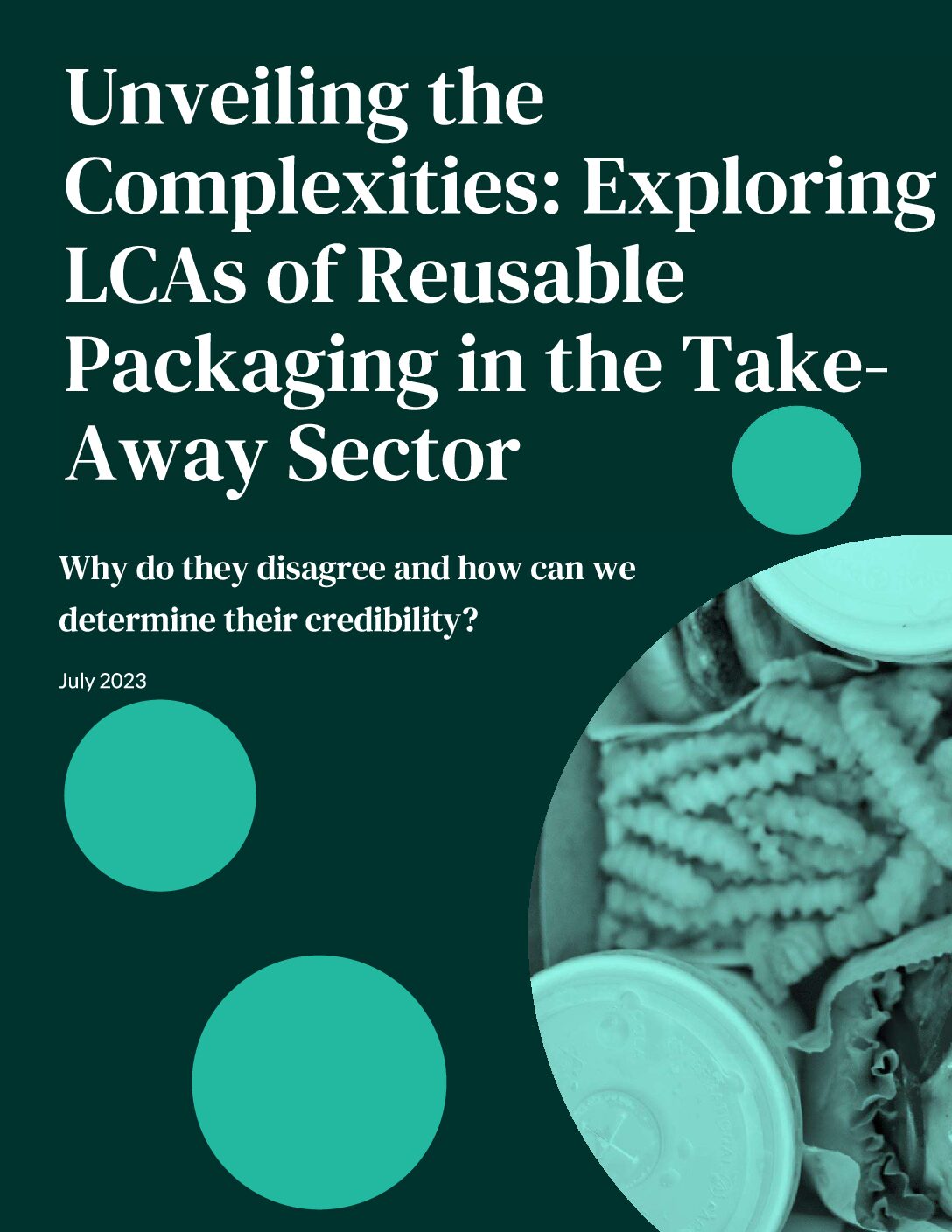
As the EU considers reuse targets in the Packaging and Packaging Waste Regulations (PPWR), this Eunomia Research & Consulting report highlights the lack of transparency from industry leaders in shaping the discussion around reusable packaging. In many cases, influential studies promoting single-use packaging have been found to exhibit biases against reuse due to funding interests and cherry-picked scenarios. The report evaluates three Life Cycle Assessments, highlighting the importance of transparent methodology and accurate assumptions in understanding the true potential of reusable take-away packaging.
Download the full joint report by Reloop and Zero Waste Europe below.
Full report available in English.
Executive Summary available in English and Croatian.
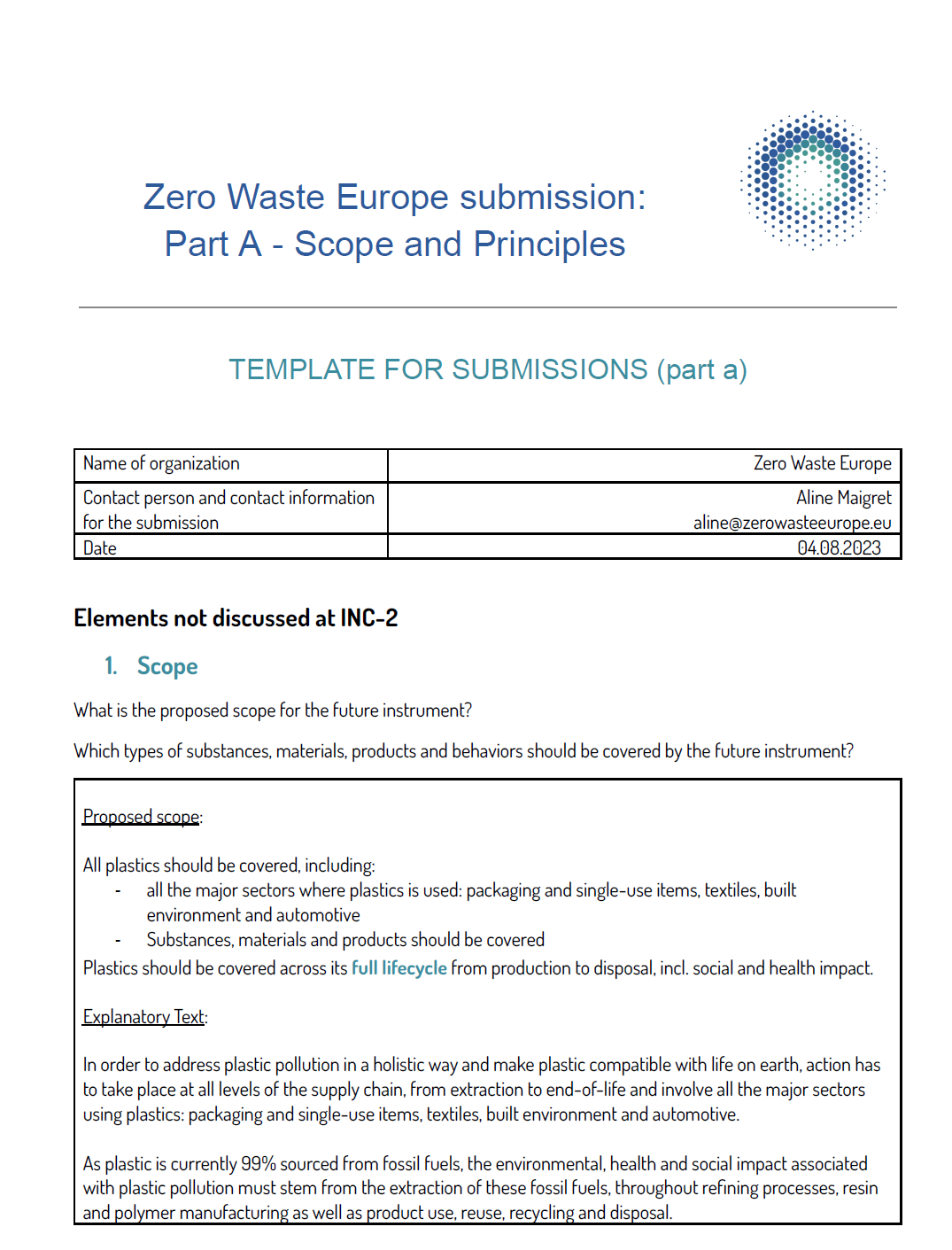
Zero Waste Europe has been working on policies and measures targeting plastic pollution since the early 2000s, has done extensive research, movement building, and policy advocacy, and has implemented zero waste solutions since then.
This document contains our submission to the third Intergovernmental Negotiating Committee (INC-3) to develop an international legally binding instrument on plastic pollution.
Available in English.

This policy paper warns that the apparel industry must take urgent action to address emissions gaps to reach the climate targets of the Paris Agreement. Despite being the world’s largest buyer of clothes, the EU has not set concrete prevention targets on textile waste, hindering progress towards a fashion industry compatible with planetary boundaries. The paper recommends setting real textile waste reduction targets at the EU level, starting with an overall reduction target of at least one third by 2040 compared to 2020, and highlights the need to lead by example in addressing the negative impacts of the textile industry.
Available in English, French, and Croatian.
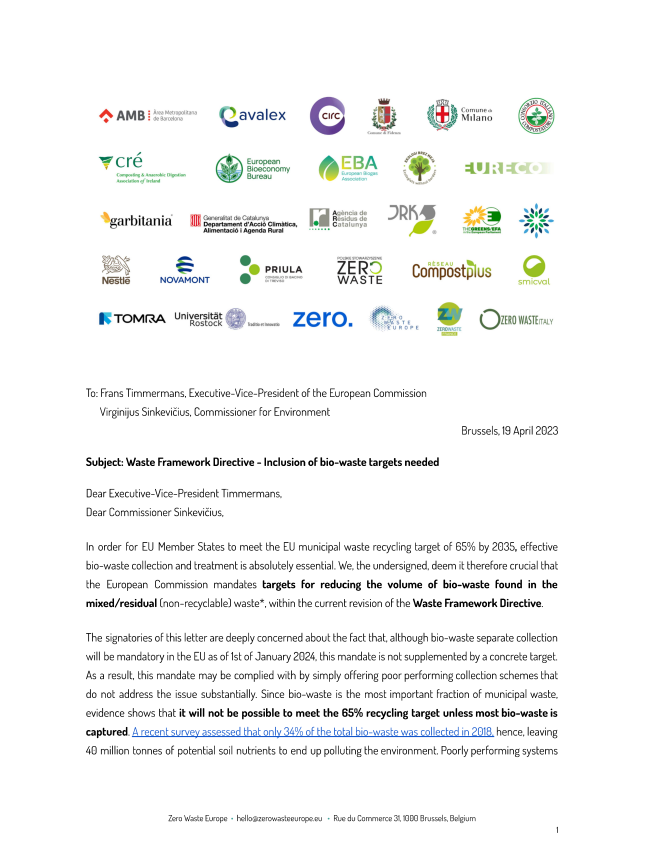
The mandatory bio-waste collection in the EU, slated to begin on the 1st of January 2024, lacks concrete collection targets which will pave the way for inadequate schemes that fail to address the issue at hand. Bio-waste holds immense potential for recycling valuable resources. Yet, evidence shows that without a concerted effort to capture and utilise bio-waste, we will fall short of the ambitious 65% recycling target by 2035. A mere 34% of the total bio-waste was collected in 2018, leaving a staggering 40 million tonnes of potential soil nutrients to be discarded, polluting our environment and squandering invaluable resources. Our environment, our communities, and our future generations deserve better.
The signatories of this joint letter, including MEPs, environmental organisations, and industry leaders, demand mandatory targets on bio-waste reduction within the current revision of the WFD, and call on the European Commission to provide proper guidance and tools to Member States to achieve them. Adopting specific targets for biowaste in residual waste aims to incentivize proper collection and recycling practices.
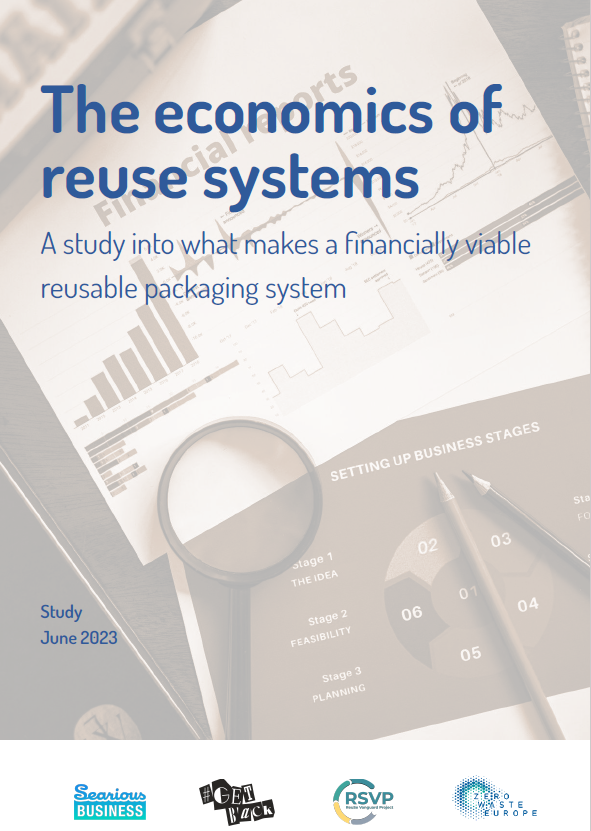
After elimination, the widespread uptake of reusable packaging has the highest potential to reduce plastic production. This view is sustained by a recent shift in legislative focus in the European Union’s Packaging and Packaging Waste Regulation (PPWR) and the United Nation’s Global Plastic Treaty to end plastic pollution. However, several brands and industry associations have been hesitant to wholeheartedly embrace reusable packaging.
The study by Searious Business and Zero Waste Europe examines 3 packaging categories in an open loop system (so not within one location), in Spain as an archetype country: 1) food containers for takeaway food, 2) secondary transport packaging and 3) beverage bottles. The results show that reuse packaging will only become even more economically viable in the next few years and providing faster return on investments.
Executive summary available in English, Estonian, Montenegrin, Ukrainian, and Polish.
Full report available in English, German, French, Spanish, Dutch, and Italian.
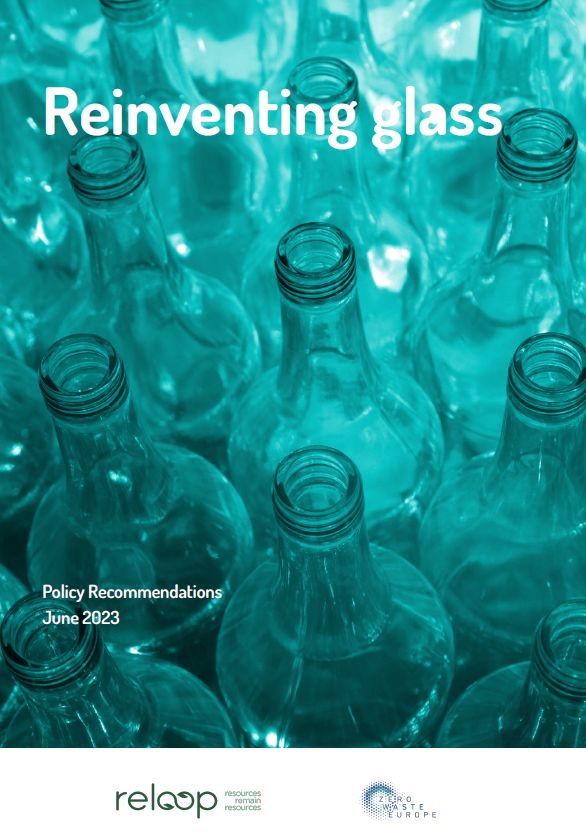
Single-use glass is proven to have the highest overall environmental footprint compared to other single-use materials. On the other hand, reusable glass offers the greatest potential to reduce environmental impacts: reusable glass bottles produce 85% fewer carbon emissions than their single-use counterparts, 75% fewer carbon emissions than plastic (PET), and 57% fewer carbon emissions than aluminium cans.
Taking into account the findings of the ZWE-Eunomia ‘Decarbonisation of single-use beverage packaging’ study, ZWE and Reloop urge the EU Packaging & Packaging Waste Regulation to set the path for single-use glass to be replaced with reusable glass in the coming years.
Available in English, Polish, and Croatian.
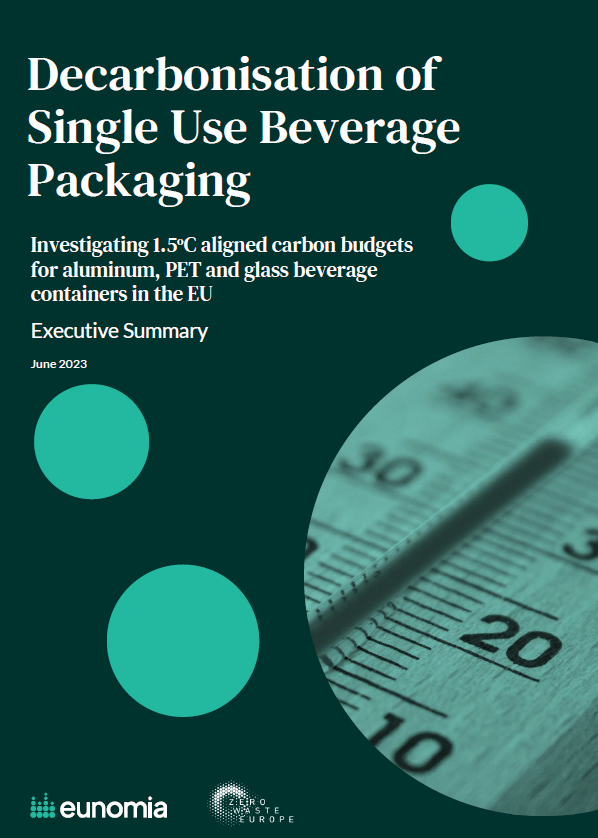
Commissioned to Eunomia Research & Consulting by Zero Waste Europe, this study builds upon Eunomia’s previous investigation into materials decarbonisation pathways in the report “Is Net Zero Enough for the Material Production Sector?”.
Focussing on the four materials with the greatest emissions globally, the study found that each will have great difficulty in reducing GHG emissions in line with a 1.5°C future by 2050, particularly if mass consumption continues and increases. Whilst studying the global material picture provides valuable insights; policymakers may find it more useful to have the same approach applied at the product level. Therefore, this study delves into the Net Zero pathways of aluminium, PET, and glass when utilised in beverage packaging within the EU, evaluating their potential performance within a cumulative GHG emissions budget that aligns with the goal of limiting global warming to 1.5°C.
Full report available in English. Executive summary available in English, French, and Latvian.
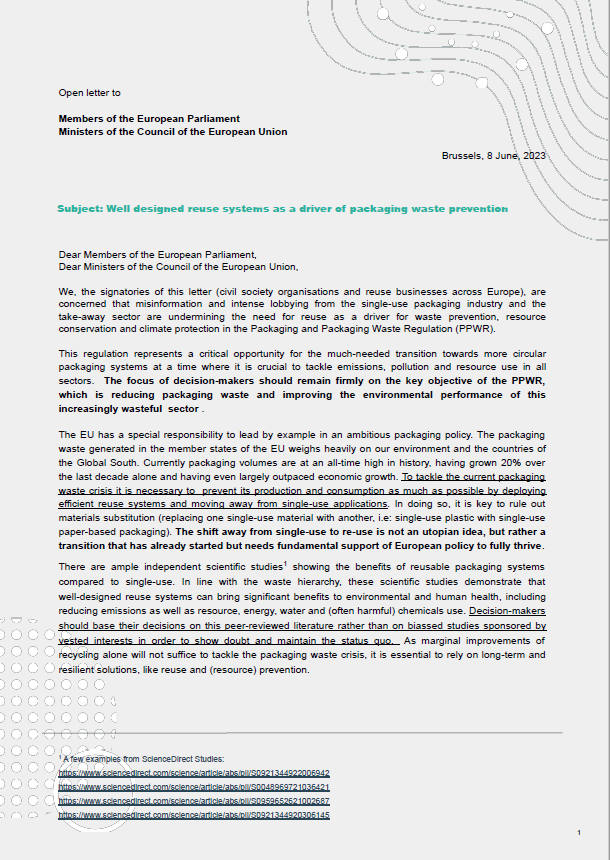
In an open letter, the Rethink Plastic alliance and a coalition of 79 organisations (including Zero Waste Europe) consisting of civil society organisations and businesses advocate for the integration of well-designed reuse systems as a catalyst for preventing packaging waste in the revision of the EU Packaging & Packaging Waste Regulation (PPWR).
Available in English.
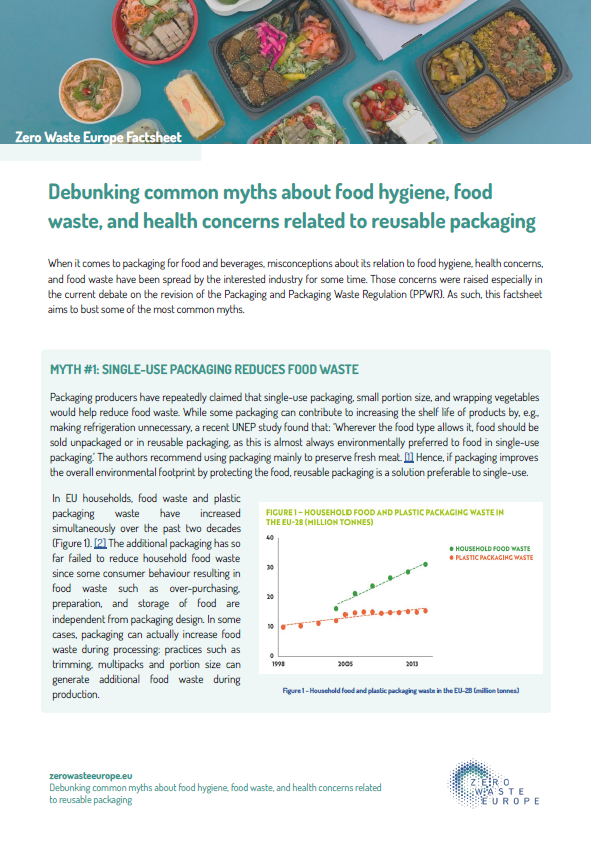
When it comes to packaging for food and beverages, misconceptions about its relation to food hygiene, health concerns, and food waste have been spread by the interested industry for some time. Those concerns were raised especially in the current debate on the revision of the Packaging and Packaging Waste Regulation (PPWR). As such, this factsheet aims to bust some of the most common myths.
Available in English, Estonian, French, Hungarian, Montenegrin, Latvian, and Slovenian.

The current revision of the Waste Framework Directive, which has guided EU policy in this area since 1975, offers an opportunity to design a coherent and consistent policy framework for a circular economy.
This white paper by Eunomia, TOMRA, Minderoo Foundation, Handelens Miljøfond, and Zero Waste Europe presents a vision for 2040, describing the way in which society will use materials and products in an economy that is well on its way to circularity. This sets the stage for the development of a detailed policy blueprint, supported by research and stakeholder engagement, for the steps needed to realise the vision.
Available in English
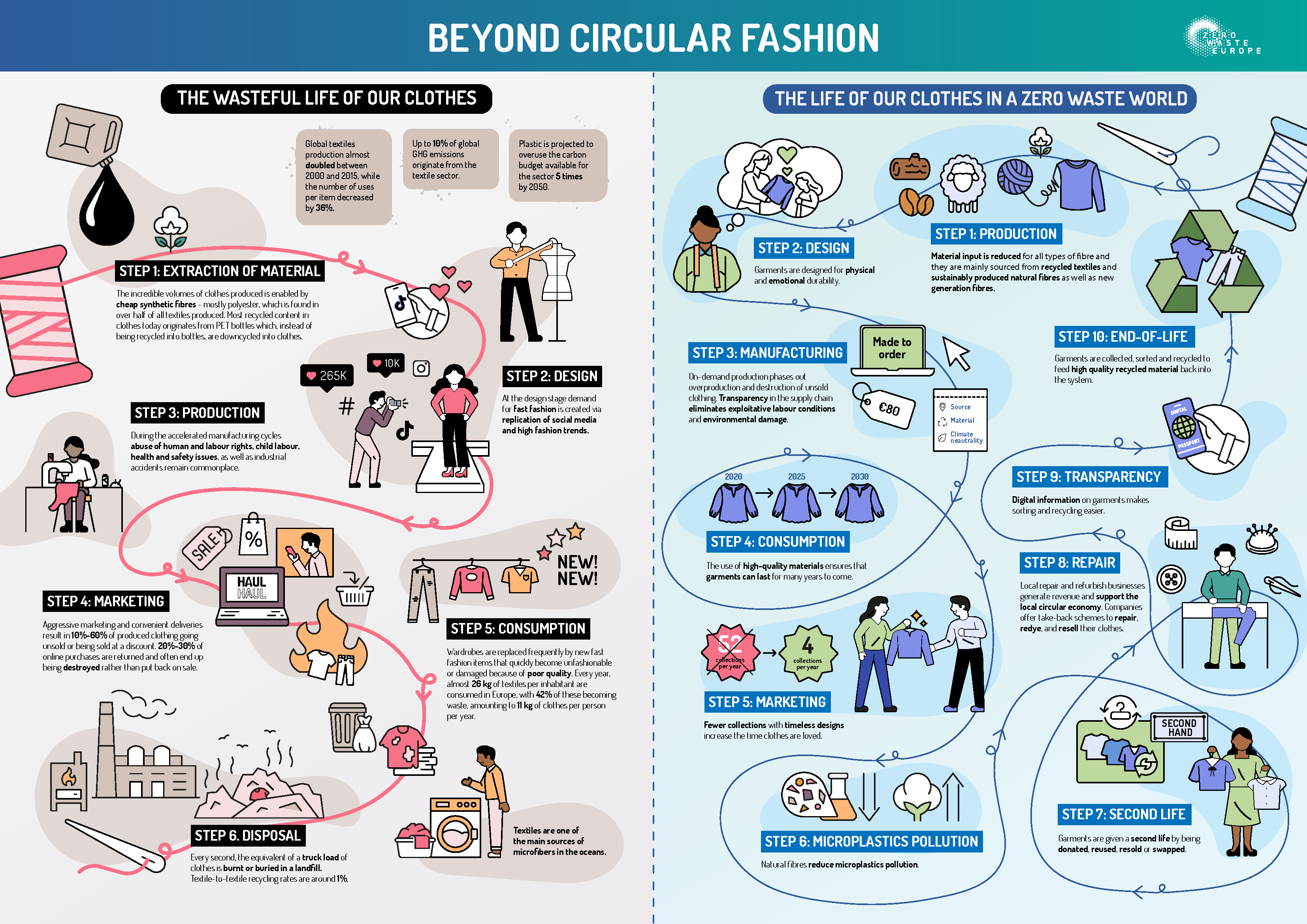
For every ultra-fast fashion model, there is a sustainable one waiting to break the system. We can make them norm by supporting zero waste fashion business models.
Our infographic shows the full process and benefits of a zero waste fashion business model, as well as the major differences when compared to a linear model.
This material is complementary to Zero Waste Europe’s “Beyond circular fashion – a new business model for the fashion industry” report, published in January 2023.
Available in English, Croatian, Estonian, French, Montenegrin, Spanish and Italian.
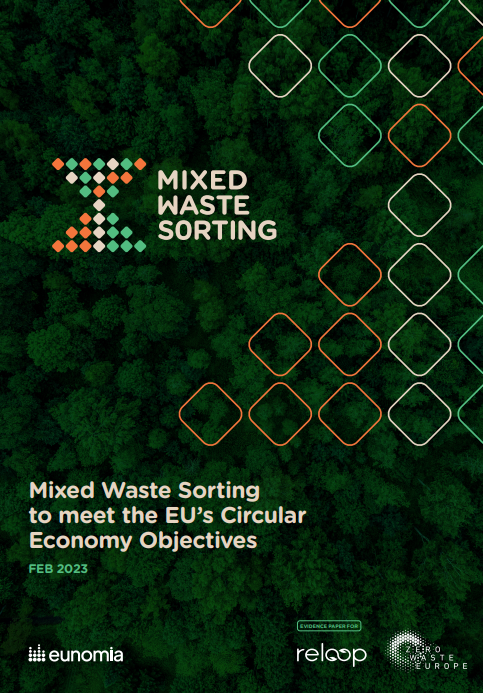
This report and policy briefing studied whether, and to what extent, the EU recycling targets can be met through improved recyclability of packaging and increased separate collections of municipal waste—and, if not, what measures could be taken to achieve them.
It has examined the role mixed waste sorting (MWS) could play in three EU countries with high recycling performance – Germany, Belgium, and Sweden. The conclusion was concluded that, in addition to separate collection and improved recyclability of plastic packaging, a full roll-out of effective MWS is necessary to ensure that recycling targets are consistently met and to ensure progress towards the EU’s wider carbon emissions reduction goals.
Available in English.



